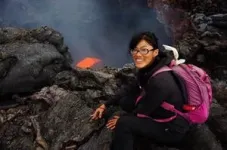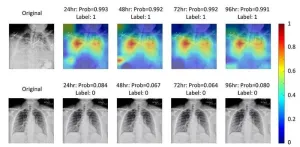(Press-News.org) The Arizona Bioindustry Association announced that renowned Valley fever researcher John Galgiani, MD, professor and director of the Valley Fever Center for Excellence at the University of Arizona College of Medicine – Tucson, is the 2023 recipient of the AZBio Pioneer Award for Lifetime Achievement.
The Pioneer Award is the highest honor awarded by Arizona’s bioscience community and is extended to an Arizonan whose body of work has made life better for people at home and around the world. Galgiani’s four decades of Valley fever research, education and patient care earned him the accolade, which will be presented to him Sept. 27 during the AZBio awards ceremony at the Phoenix Convention Center.
“Dr. Galgiani is a true pioneer whose 40-year commitment to unraveling the mysteries of Valley fever has advanced medical science to the point that we are at the brink of seeing the world’s first efficacious fungal vaccine. This represents a momentous step forward in the fields of medical mycology and immunobiology, and stands to benefit millions of people,” said Michael M.I. Abecassis, MD, MBA, Iovanna C. Lopez Dean of the University of Arizona College of Medicine – Tucson.
Valley fever is a respiratory disease caused by inhaling airborne spores of the fungus coccidioides. In severe cases, the disease can spread from the lungs to other parts of the body and can be fatal. It has become a pressing concern in Arizona, where more than half of all reported U.S. cases occur.
Galgiani was instrumental in the 1996 establishment of the Valley Fever Center for Excellence, which plays a pivotal role in disseminating knowledge, aiding patients, and advancing groundbreaking research on the disease and the fungus that causes it. As the leader of a National Institutes of Health study group for more than 25 years, Galgiani headed clinical trials that led to a novel drug treatment that completely changed clinical management of Valley fever meningitis, a life-threatening complication of the disease.
Galgiani and other UArizona researchers recently developed an experimental Valley fever vaccine that has shown to be effective in dogs, which also are susceptible to the disease. If the canine vaccine clears upcoming veterinary clinical trials as expected, it would become the world’s first viable fungal vaccine. Galgiani and his colleagues are currently planning the next steps needed to make the vaccine available to humans.
In addition to his vaccine research, Galgiani educates medical providers across Arizona about the disease. He recently founded the Valley Fever Collaborative, a UArizona Health Sciences initiative that unites UArizona, Arizona State University and Northern Arizona University researchers in their efforts to develop rapid diagnostic tests and a potential cure for Valley fever. AZBio is a nonprofit trade association supporting the growth of Arizona’s life science sector. Tickets to the annual AZBio Awards can be purchased on the AZBIO website.
END
UArizona Valley fever expert Galgiani to receive lifetime achievement award
John Galgiani, MD, director of the Valley Fever Center for Excellence, will receive the AZBio Pioneer Award, which recognizes his career accomplishments
2023-08-21
ELSE PRESS RELEASES FROM THIS DATE:
University breaks ground on one-of-a-kind semiconductor facility
2023-08-21
The University of Arkansas celebrated an important milestone with the groundbreaking on a building that Chancellor Charles Robinson suggested might someday rival the U of A’s most iconic structure, Old Main, in significance to the university and the state of Arkansas.
Robinson and other university leaders, including University of Arkansas System President Don Bobbitt and members of the U of A System Board of Trustees, as well as researchers and industry leaders, gathered at the Arkansas Research and Technology Park in South Fayetteville to celebrate construction of the national Multi-User Silicon Carbide ...
Do prisons hold the key to solving the opioid crisis?
2023-08-21
With opioid overdose deaths surging in the United States, many communities are in desperate need of solutions to bring down the body count. Among the most promising is strengthening prison reentry programs for highest-risk users, a Rutgers-led study has found.
“For people who use drugs and have been in prison for several years, the reentry period can be chaotic and disorienting,” said Grant Victor, an assistant professor in the Rutgers School of Social Work and lead author of the study published in the Journal of Offender Rehabilitation.
“Closing ...
AI to predict critical care for patients with COVID-19
2023-08-21
The COVID-19 pandemic dealt a huge blow to healthcare systems and highlighted their major shortcomings. As of June 2023, there have been over 760 million confirmed cases of COVID-19, with almost 7 million deaths worldwide. During the major COVID-19 outbreaks, hospitals often had their intensive care units (ICU) running at full capacity for providing invasive mechanical ventilation to patients who were diagnosed as positive for COVID-19. These ICUs often operated with insufficient staff and intubation equipment.
One way to mitigate such problems is to accurately predict the prognosis ...
Simple blood test may predict future heart, kidney risk for people with Type 2 diabetes
2023-08-21
Research Highlights:
An analysis of a clinical trial of more than 2,500 people with Type 2 diabetes and kidney disease found that high levels of four biomarkers are strongly predictive for the development of heart and kidney issues.
People who took canagliflozin, a sodium glucose co-transporter 2 inhibitor (SGLT2 inhibitor), had lower levels of the four biomarkers compared to those who took a placebo over the three-year study period.
Treatment with canagliflozin helped to substantially reduce the risk of hospitalization for heart failure and other heart complications among patients considered to have the highest risk.
Embargoed until 1 p.m. CT/2 p.m. ET Monday, ...
Listening for “sounds” from the far corners of space
2023-08-21
Scientists spectacularly confirmed the existence of gravitational waves several years ago, but now they are searching the cosmos for new and different types of these waves that result from different objects in deep space.
Benjamin Owen, a professor in the Department of Physics and Astronomy at Texas Tech University, was recently awarded a three-year National Science Foundation (NSF) grant that aims to uncover and confirm additional types of gravitational waves.
“So far with gravitational waves we’ve seen what happens when you have ...
Agrela Ecosystems ignites innovation in data-driven agriculture
2023-08-21
ST. LOUIS, MO, August 21, 2023 – Agrela Ecosystems, a startup launched by Nadia Shakoor, PhD, principal investigator, at the Donald Danforth Plant Science Center announced the pilot launch of its flagship product, PheNodeTM. This milestone marks the first step towards a full-scale commercial release set for 2025. PheNode is an advanced, scalable environmental sensor platform designed to empower users with customizable data collection and the rapid integration of new technologies. Already creating a buzz, the platform is now collecting data and generating customer feedback, ...
PS gene-editing shown to restore neural connections lost in brain disorder
2023-08-21
MINNEAPOLIS/ST. PAUL (08/21/2023) — A new study from the University of Minnesota is the first to demonstrate the ability for gene therapy to repair neural connections for those with the rare genetic brain disorder known as Hurler syndrome. The findings suggest the use of gene therapies — an entirely new standard for treatment — for those with brain disorders like Hurler syndrome, which have a devastating impact on those affected.
The study was published in the Nature journal Scientific Reports.
Hurler syndrome, also known as mucopolysaccharidosis type I (MPS I), is a genetic disorder affecting newborns ...
Argonne receives funding to use AI and machine learning for nuclear physics research
2023-08-21
The U.S. Department of Energy (DOE) announced $16 million for 15 projects that will implement artificial intelligence (AI) methods to accelerate scientific discovery in nuclear physics research. DOE’s Argonne National Laboratory will lead two of those projects and be a collaborator on another.
These projects will use AI and Machine Learning (ML) tools and methods for nuclear physics experiments, simulation, theory and accelerator operation to expand and accelerate scientific reach.
“Artificial intelligence has the potential to shorten the timeline ...
Bloom studying impact of exposure to perfluoroalkyl substances on weight loss
2023-08-21
Michael Bloom, Associate Professor, Global and Community Health, received $158,900 from the National Institutes of Health for the project: "Impact of Exposure to Perfluoroalkyl Substances on Weight Loss: A Pilot Study of Hispanic Children with Overweight/Obesity Participating in a Community-based Weight Loss Intervention Program."
In this pilot study, Bloom is evaluating associations between exposures to perfluoroalkyl substances (PFAS) and weight lost during a 10-week weight loss intervention among Hispanic children with overweight and obesity. He and his collaborators will quantify the association between 12 different PFAS ...
Schintler & collaborators to study perceptions of efficiency & bias in algorithmic versus human peer review
2023-08-21
Laurie Schintler, Associate Professor, Schar School of Policy and Government, is set to receive funding for the project: "Perceptions of Efficiency and Bias in Peer Review: Algorithmic versus Human Decision Making."
This project is a collaboration between the Schar School of Policy and Government (GMU) and the Department of Sociology and Anthropology (CHSS-GMU). The investigators on the team include:
PI Laurie A. Schintler;
Co-PI Connie L. McNeely, Professor, Schar School of Policy and ...
LAST 30 PRESS RELEASES:
Scientists discover why we know when to stop scratching an itch
A hidden reason inner ear cells die – and what it means for preventing hearing loss
Researchers discover how tuberculosis bacteria use a “stealth” mechanism to evade the immune system
New microscopy technique lets scientists see cells in unprecedented detail and color
Sometimes less is more: Scientists rethink how to pack medicine into tiny delivery capsules
Scientists build low-cost microscope to study living cells in zero gravity
The Biophysical Journal names Denis V. Titov the 2025 Paper of the Year-Early Career Investigator awardee
Scientists show how your body senses cold—and why menthol feels cool
Scientists deliver new molecule for getting DNA into cells
Study reveals insights about brain regions linked to OCD, informing potential treatments
Does ocean saltiness influence El Niño?
2026 Young Investigators: ONR celebrates new talent tackling warfighter challenges
Genetics help explain who gets the ‘telltale tingle’ from music, art and literature
Many Americans misunderstand medical aid in dying laws
Researchers publish landmark infectious disease study in ‘Science’
New NSF award supports innovative role-playing game approach to strengthening research security in academia
Kumar named to ACMA Emerging Leaders Program for 2026
AI language models could transform aquatic environmental risk assessment
New isotope tools reveal hidden pathways reshaping the global nitrogen cycle
Study reveals how antibiotic structure controls removal from water using biochar
Why chronic pain lasts longer in women: Immune cells offer clues
Toxic exposure creates epigenetic disease risk over 20 generations
More time spent on social media linked to steroid use intentions among boys and men
New study suggests a “kick it while it’s down” approach to cancer treatment could improve cure rates
Milken Institute, Ann Theodore Foundation launch new grant to support clinical trial for potential sarcoidosis treatment
New strategies boost effectiveness of CAR-NK therapy against cancer
Study: Adolescent cannabis use linked to doubling risk of psychotic and bipolar disorders
Invisible harms: drug-related deaths spike after hurricanes and tropical storms
Adolescent cannabis use and risk of psychotic, bipolar, depressive, and anxiety disorders
Anxiety, depression, and care barriers in adults with intellectual and developmental disabilities
[Press-News.org] UArizona Valley fever expert Galgiani to receive lifetime achievement awardJohn Galgiani, MD, director of the Valley Fever Center for Excellence, will receive the AZBio Pioneer Award, which recognizes his career accomplishments




